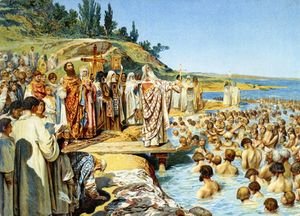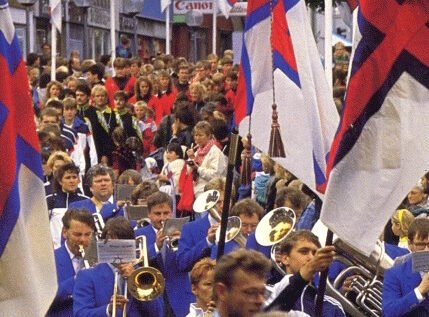Chronos, Kairos and Aion are the three deities of time, events and epic destinies. Here is the multi-religious and multicultural calendar!
Find us on our website Mythology and Legend, on Facebook and on instagram !

The schedule in brief from D-2 to D+5
- July 12, 2025, Every day: Olivier Plunket
- July 12, 2025, Every day: Twelfth
- July 13, 2025, Everyday: Shichigatsu bon
- July 14, 2025, Every day: Nachi no hi matsuri
- July 14, 2025, Every day: Synoikia
- July 14, 2025, : Tlaxochimaco
- July 15, 2025, : Saint Rosalie
- July 15, 2025, : Vladimir the Great
- July 16, 2025, Daily: Jersey Helier
- July 16, 2025, Every day: Our Lady of Mount Carmel
- July 17, 2025, : Gion Matsuri
- July 17, 2025, : Ognyena Maria
- July 19, 2025, Daily: Dehwa Rabba
- July 19, 2025, Everyday: Kumagaya Uchiha Masturi
- July 19, 2025, : Lucaria
The complete interactive calendar
July 28, 2025
–
July 28, 2025

Today, the Orthodox commemorate the Baptism of the Rus. It refers to the landmark event of the mass baptism of the people of kyiv in 988, when Grand Prince Vladimir accepted Orthodox Christianity as the religion of his lands. The event, as recorded in the Primary Chronicles, has been considered the turning point in the introduction of Christianity among the Eastern Slavs. #mythology #myth #legend #calendar #July 28 #Orthodoxy #Kiev
–
July 28, 2025

Today, the people of the Faroe Islands celebrate Ólavsøka. The literal meaning is "Olaf's Vigil", originating from the death of Saint Olaf at the Battle of Stiklestad in 1030. Vøka comes from the Old Norse Vaka, which was a religious celebration which always lasted two days. #mythology #myth #legend #calendar #Olaf #Faroe #July 28
Multicultural and multi-religious almanac
An almanac is a calendar showing the main dates of the calendar, the religious holidays, bearing ephemerides such as the phases of the moon or the duration of the days (lunar and solar calendars).
A calendar is a system for marking dates according to time. Such a system was invented by men to divide and organize time over long periods. The observation of the periodic phenomena of the environment in which they lived — such as the daily movement of the shadow, the return of the seasons or the lunar cycle — served as the first references for organizing the agricultural, social and religious life of societies.
The calendar used today in most of the world is the Gregorian calendar. In everyday language, an ephemeris designates what happens daily; the ephemeris of the day is the list of the significant events of this day.